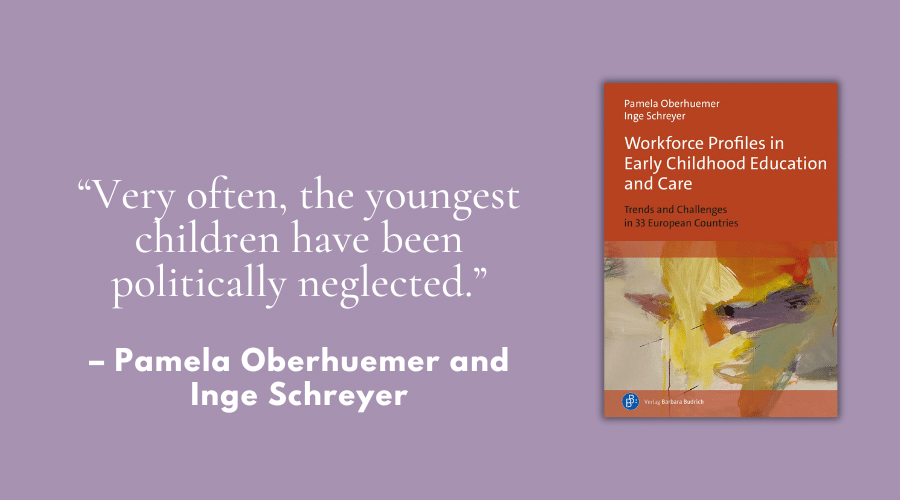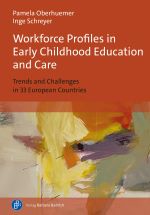In which areas do you observe the most significant differences in early childhood workforce profiles across countries? We conducted an interview with Pamela Oberhuemer and Inge Schreyer, authors of the book “Workforce Profiles in Early Childhood Education and Care. Trends and Challenges in 33 European Countries”. In this interview, we are asking about the background of the book and the most important findings.
+++ The book is also available in German as “Personalprofile in Systemen der Frühpädagogik. Trends und Herausforderungen in 33 europäischen Ländern”+++
Interview on “Workforce Profiles in Early Childhood Education and Care. Trends and Challenges in 33 European Countries”
Your publication compiles selected findings from the SEEPRO-3 study on the early childhood workforce. This study includes research across 27 EU member states and six non-EU countries. What are the key research questions that guided this study?
Our research questions focused on key characteristics of the staffing policies in early childhood education and care (ECEC) across Europe. The aim was to provide a comprehensive profile of the core professionals as well as leaders and assistant co-workers in centre-based settings for children of all ages up to primary school entry. In collaboration with experts in 33 countries, we looked at the governance of ECEC, qualification pathways and competence requirements, the overall composition of the workforce, specialist support staff, frameworks for continuing professional development, current reforms and recent research relating to professionalization and staffing, selected working conditions and finally, workforce issues and challenges. Complementary background data provided information on the national ECEC systems and demographics.
Which topics or themes from the study do you focus on in this publication?
This publication summarises key themes from the detailed ECEC workforce profiles and key contextual data available on the SEEPRO-3 website and complements them by providing a comparative perspective. First, in a scene-setting part, we attempt to contextualise the workforce. This means looking at topics such as type of system organisation in each country (unitary, part-integrated or bi-sectoral), the main providers of ECEC services, whether young children have a legal entitlement to a place in ECEC, or whether enrolment is compulsory. It also includes a spotlight on early childhood curricula and associated assessment practices as well as approaches to parenting leave. Second, we focus on the ECEC staff, detailing the minimum qualification requirements and professional profiles of core group-leading practitioners, the wide range of job responsibilities of centre leaders, and the different kinds of support and counselling staff. Further, we look at competence specifications, curricula and the role of field practice in initial professional education, as well as alternative routes into the ECEC professions and opportunities for in-career professional development. In a final part we highlight reform initiatives as well as workforce and system related challenges across Europe, the most significant being the high level of staff shortages.
In which areas do you observe the most significant differences in early childhood workforce profiles across countries?
One significant difference concerns the minimum qualification requirements for becoming a group-leading professional. Whereas four in 33 countries require a Master’s degree for working with children aged 3 and above (a level 7 qualification on UNESCO’s International Standard Classification for Education, ISCED), in five countries vocational qualifications at ISCED levels 5, 4 or even 3 are considered sufficient, revealing a huge qualification gap. Similarly, whereas core practitioner profiles and qualification requirements are the same in all the 10 unitary ECEC systems (ISCED 6, Bachelor level), in other system types the qualification levels between staff working with the younger and older children are distinctly different. Another significant difference is to be found in the professional profiles of core practitioners. Only the unitary ECEC systems require a specialisation across all ECEC age groups – an “Early Childhood Pedagogy Professional”. All other countries have split professional profiles, none of which are fully specialised in working across the entire ECEC phase, and in several cases are predominantly prepared as Primary Education specialists. Further differences relate to the proportion of higher education qualified and non-qualified staff in the workforce.
Can you indicate what the strongest factors influencing these differences are?
A strong influencing factor is the type of ECEC system – whether split according to specific age groups or integrated across all age groups before primary school entry. Another influence is the policy priority that countries give to working with the youngest children. Very often, this age group has been neglected compared with those working in pre-primary settings in the education system.
That’s why we have chosen Barbara Budrich as our publishing partner:
Our good experience of working with Barbara Budrich on two books back in 2010 was the impetus for us to seek contact again for this specific publication. Since ours was an international project, another main reason was the possibility of publishing in English as well as German and in that way of reaching English-language readers. We were very impressed by the way we were guided through the preparation of the manuscripts. It all seems a little daunting to start with, but with the help of concise instructions and encouragement by the specialist members of the publishing team, we have reached the end of the journey successfully in what seems to us to be a record length of time. Thank you!
About Pamela Oberhuemer and Inge Schreyer
 Pamela Oberhuemer is currently an Honorary Senior Research Fellow at the Thomas Coram Research Unit, Social Research Institute, IOE Faculty of Education and Society, University College London. She previously had a long career at the State Institute for Early Childhood Research and Media Literacy in Munich, after which she worked as a freelance researcher specialising in early childhood education and care systems and professionalisation issues in Europe.
Pamela Oberhuemer is currently an Honorary Senior Research Fellow at the Thomas Coram Research Unit, Social Research Institute, IOE Faculty of Education and Society, University College London. She previously had a long career at the State Institute for Early Childhood Research and Media Literacy in Munich, after which she worked as a freelance researcher specialising in early childhood education and care systems and professionalisation issues in Europe.
 Inge Schreyer is a senior researcher at the State Institute for Early Childhood Research and Media Literacy (IFP) in Munich and Amberg. She contributed to the first SEEPRO study Systems of Early Childhood Education and Professionalisation in Europe (project leader: Pamela Oberhuemer), funded by the German Federal Ministry for Family and Youth Affairs, and took over the management of the two follow-up studies with project starts in 2015 and 2021.
Inge Schreyer is a senior researcher at the State Institute for Early Childhood Research and Media Literacy (IFP) in Munich and Amberg. She contributed to the first SEEPRO study Systems of Early Childhood Education and Professionalisation in Europe (project leader: Pamela Oberhuemer), funded by the German Federal Ministry for Family and Youth Affairs, and took over the management of the two follow-up studies with project starts in 2015 and 2021.
Order “Workforce Profiles in Early Childhood Education and Care” in our shop
or download as e-book
Workforce Profiles in Early Childhood Education and Care.
Trends and Challenges in 33 European Countries
by Pamela Oberhuemer and Inge Schreyer
More interviews can be found on our blog.


